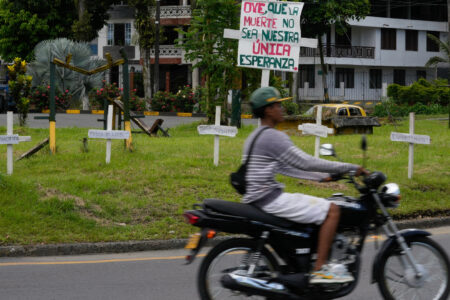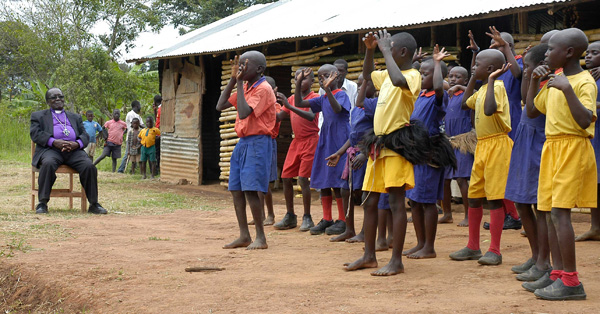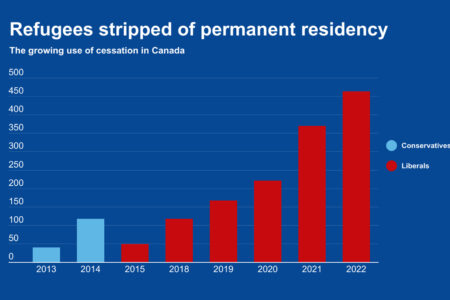
A
fter dithering under political pressure from abroad, Ugandan President Yoweri Museveni finally agreed in February to sign into law a bill that increases criminal penalties for “aggravated homosexuality.” Rushed through Parliament at the end of last year, the Bill punishes “serial offenders” with life in prison, and requires citizens to report gays and lesbians to the police or face prison terms themselves. Museveni had originally balked at signing the Bill under heavy lobbying from Western governments, whose threats both to Uganda’s international reputation and to its economy — especially the potential withdrawal of foreign aid — put him in a tough spot. In the end, he signed it anyway.
Museveni’s initial reluctance certainly did not appear motivated by concern for human rights. At the time, his explanation was delivered in a rambling, eight-page letter to Parliament in which he called gay people “abnormal,” “nothing-doers,” and “sexually starved.” Uganda’s gays need rescue, he said in January, not life in prison. But the push for harsh criminal penalties in Uganda was not easily dissuaded. Nor, as we increasingly see, is Uganda’s law an aberration internationally.
Homosexuality is currently criminalized in many African countries, and various degrees of discrimination extend from Russia and its neighbours through parts of the Islamic world and the Caribbean. Uganda’s law is part of a swath of recent homophobic legislation in the region. Nigerian President Goodluck Jonathan recently signed a law passed by Parliament last year that bans same-sex marriages and imposes up to 14 years in prison for gay couples who openly display their relationships. The country’s religious and political leaders defended the law as an expression of national sovereignty, dismissing foreign critics as hypocrites who champion democracy only when it conforms to their values. A wave of arrests have since been reported.
Into this murky soup, director Roger Ross Williams has dropped God Loves Uganda, a 2013 documentary that examines the social forces driving the criminalization movement in Uganda. His film follows a group of white missionaries, trained by the US-based International House of Prayer (IHOP), as they ship out to Uganda to spread the good word. The film intercuts its narrative with interviews with evangelical leaders (and hidden-camera footage) at IHOP and other evangelical organizations on both sides of the Atlantic. Williams takes those interviews as evidence that Uganda’s intolerance comes from American evangelicals who, fearing they have lost the culture war at home, see Uganda as fertile ground for exporting their war on sexual vice.
The Conservatives have to walk a tightrope, feeding their socially conservative base red meat while reaching out toward the middle.
Canada’s Conservative government has been among those criticizing Uganda’s anti-gay violations. The denunciations were, initially at least, loud and public. From a podium in Quebec City in 2012, Minister of Foreign Affairs John Baird castigated Uganda for its human rights record with respect to LGBT people. His criticism was met with an equally forceful push-back from Rebecca Kadaga, the Speaker of the Ugandan Parliament, who was in the room. She used her allotted response time to “protest in the strongest terms the arrogance exhibited by the foreign minister of Canada.”
In Uganda, there was worry in LGBT circles that Baird was doing their cause more harm than good. Frank Mugisha, the diminutive and soft-spoken leader of the Ugandan gay rights group Sexual Minorities Uganda, blitzed Canadian media before an appearance in Toronto last year. His message: instead of public shaming like Baird’s, Canada should be using backroom diplomatic channels to pressure Uganda.
Mugisha delivered an obvious point: no country likes having its sovereignty messed with. Indeed, Kadaga deployed Baird’s comments back home in Uganda on her own behalf, using them as proof that Canada and other Western countries were trying to foist homosexuality on Uganda. The list of Uganda’s critics runs from the Obama administration to the European Union and the UN Human Rights Commissioner, all of which reinforces the backlash against foreign interference. And it has strengthened the perception among some Ugandans that homosexuality itself is a Western scourge, exported to Africa with colonization.
God Loves Uganda shows this tension. By juxtaposing American missionary work in Uganda with preachers’ interviews about homosexuality, Williams invites viewers to see anti-gay sentiment as originating in the US, not Uganda. This argument is nothing new. As acclaimed Kenyan author Binyavanga Wainaina recently pointed out in a courageous public declaration of his own homosexuality this year, the sodomy laws on the books in much of sub-Saharan Africa came from Europe, through an earlier period of colonization.

Let’s not forget that Canada has its own imported laws on homosexuality; the Supreme Court upheld the indefinite detention of “incurably homosexual” George Klippert as late as 1967. A version of the old sodomy law is still in our Criminal Code, punishable by up to 10 years in prison: section 159 forbids anal sex unless it is conducted in private, between two (and only two) people over the age of 18 or between “husband and wife.” And while section 159 has been struck down in about half of Canadian jurisdictions, it is occasionally used to apply pressure in plea bargaining, leading to differential sentences for gay offenders.
But in Uganda, it is clear that there is a sense of dealing with a foreign virus. Either homosexuality is a European import, or homophobia is. However it is cast, the problem is framed as originating beyond the Ugandan borders.
What then, is Canada to do? There is always some suspicion about a politician’s motives when international diplomacy is conducted in public. The Conservative government continually claims that foreign affairs should be conducted on the basis of principles. Were Baird’s comments directed solely at the Ugandans? And given how well entrenched these anti-gay narratives are in the Ugandan political landscape, how could he expect anything other than a push-back?
Or were his comments meant for the home crowd? Rather than trying to wring change from Uganda, Baird may have been shoring up the Conservatives’ image as moderate pragmatists — a brand they periodically deploy to attract voters in swing ridings. His comments were made in Quebec City, after all, not in Kampala.
There was some domestic political blowback: the socially conservative REAL Women of Canada denounced Baird. There is a certain richness to this, given the Conservatives’ own domestic war on sexual vice. This goes beyond their (increasingly muffled) opposition to same-sex marriage. The Conservatives have waged war on many fronts, both subtle and overt. In amending the Criminal Code, they increased penalties for sexual crimes and raised the age of consent. In the immigration realm, they discontinued visas for foreign strippers, deleted gay rights from a guide to Canada for prospective immigrants and scuttled some LGBT refugee claims by designating homophobic allies as “safe countries of origin.”
The vast majority of the Conservative caucus opposes the inclusion of transgender rights in the Canadian Human Rights Code, and one ambitious Tory MP toyed with the idea of withholding the health transfer to provinces that pay for sex reassignment surgery. Increasingly, the Conservatives are turning to the tax code to incentivize heterosexual couplehood. And let us not forget that 2014 is gearing up to be the year in which all parties use sex workers as a political punching bag. All of this troubles the narrative of Canada as a crusader against moralistic laws about sex.
Undoubtedly, the Conservatives have to walk a tightrope, feeding their socially conservative base red meat while reaching out toward the middle. In that respect, the Ugandan bill may have seemed like a gift to them, a bill so extreme that denouncing it would be met with little domestic opposition. At the same time, there was no economic downside. After all, it’s easier to target Uganda than it would be to target India, which still criminalizes sodomy, or even the US, with its own uneven treatment of LGBT people. Grandstanding against Uganda is essentially free. One measure of the Conservative government’s willingness to go against the hard currents would be to take the same message to India and the US as it does to Uganda. Another measure of sincerity would be for the Conservatives to repeal Canada’s own anal sex law.
It’s difficult to determine what impact Canada’s public gambit had on the Ugandan bill, or how more subtle pressure will work going forward. There is an appearance, at least, that foreign pressure from countries like Canada threatened to scuttle anti-gay legislation. And the Conservatives have since clearly chosen to lower the volume of their campaign, recognizing that admonishing the Ugandans in public was promoting nothing but stubborn resistance to backing down. The test of effective diplomacy is to arrive at the proper calibration of principle and pressure.
Perhaps the best test is to ask whether an action will have a cost or a benefit for the LGBT community in that country. As Mugisha warned, statements that champion LGBT rights may have the effect of solidifying the concept of homosexuality as un-African, making life for gay Ugandans more dangerous.
In this respect God Loves Uganda is a clever inversion of the usual human rights documentary. It doesn’t so much preach about LGBT rights; rather, it shows the dual-edged dangers of foreign intervention into an African debate. In doing so, it shines a light on a part of the story — the role of evangelism and its odious beliefs about homosexuality — that Baird’s lecturing ignored.
Photo: dam Jan Figel / Shutterstock







